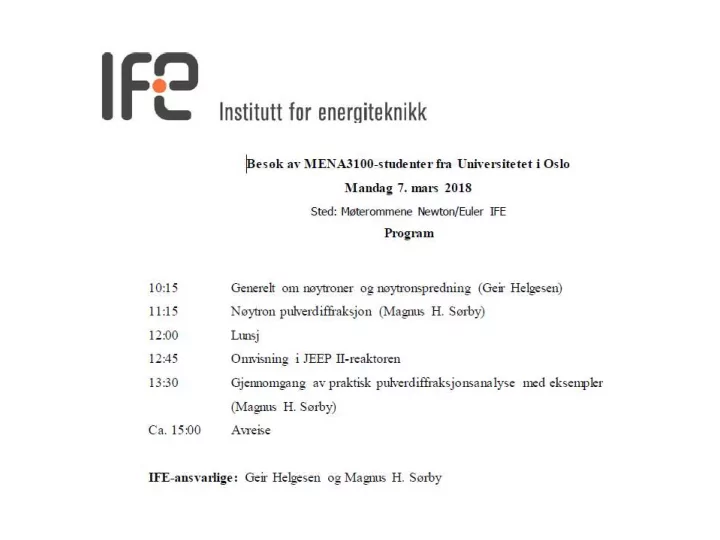

Introduction to neutron scattering for MENA3100 Part 1: - Geir Helgesen The neutron • Neutron production • Interactions between neutrons and matter • Neutron detection • What can be studied using neutrons • Small-angle neutron scattering • Radiation protection • 07.03.2018 • • • • •
Institute for Energy Tecnology - IFE • Located at Kjeller near Lillestrøm • Operating the two nuclear research reactors in Norway (Kjeller og Halden) • More than 600 employees
The neutron - production and properties
Discovery of the neutron - 1932 James Chadwick 1891-1974 Nobel prize 1935
Proton - p: Neutron: 2u + 1d quarks • Uncharged elementary particle charge= 2*(+2/3)+1*(-1/3) • With an inner electric charge distribution • Slightly heavier than a proton Neutron – n: • Lifetime 615 s p + e 1u + 2d quarks • Spinn S= ½ charge= 1*(+2/3)+2*(-1/3) • Magnetic moment 1.91 N ~ B /1836 • Can behave both as particle and wave v ~ 2km/s = wave length k= wave number (vector || v), k=2 /
Neutron production A1) Fission liquid H 2 > 5 Å ~ 1.8 Å 25 meV A2) Neutron moderation Water or heavy water B) Spallation Energy spectra – Maxwell-Boltzmann distribution
The JEEP-II reactor 250 kg UO 2 D 2 O moderated 2 MW thermal power
Interactions of neutron and x-ray beams with matter • Absorption – reduces beam intensity • Refraction – bending beam when passing • Scattering – almost all intensity transmitted in certain spatial directions dependent on the sample structure and orientation
Neutron, x-ray, and electron penetration depths (intensity reduced to 1/e = 37% of original)
Absorption Intensity: I(t) = I 0 exp(- t) t = tickness linear absorption coeffisient X-rays Neutrons Density / (cm 2 /g) / (cm 2 /g) Element Z t 1/2 t 1/2 (g/cm 3 ) 114 m B 5 2.53 2 1.4 mm 24 64 m Al 13 2.70 40 0.003 86 cm 4.0 m 57 m Cd 48 8.65 200 14 2.7 m 12 m Gd 64 7.9 330 73 2.5 m Pb 82 11.34 240 3*10 -4 2.04 m !! ln(2) Intensity reduced by 50%: cm t 1/2
Why are materials so transparent to neutron beams? Cross-sections are tiny – most of an atom is empty space for a neutron Ex.: Assume atomic nucleus has size of a golf ball neutron
Neutron-detection and neutron scattering
Scattering of neutrons • Happens in the atomic nucleus • Wave length of thermal neutrons ~ 1 Å = 0.1 nm = 10 -10 m • Range of nuclear force ~ 1 fm = 10 -15 m neutron is scattered from point source • Strength of scattering measured in the cross section in unit of barn – 1 barn = 10 -28 m 2 • -values are measured experimentally – impossible to calculate in practice • dependent on: i) atomic element Ex: Hydrogen isotopes ii) isotope of same element iii) nuclear spin state
Neutron detection processes The only way to detect a neutron is to destroy it neutron absorption with energy release 3 He gas 6 Li or BF 3 or ZnS n Two main detection techniques: He-3: Scint. counter: - high efficiency (75%) - high countrate - low g -sensitivity - can be big
Detector example: Moving the neutron beam away from the reactor:
What can we learn from neutron scattering? • Material structure • crystal structure • disordered materials, alloys (grain size, form ….) • structural defects • liquid structure (molecular distances and orientations) • Dynamics • molecular rotations (NH 2 -, CH 3 - , …) • vibrations • sound waves – phonons in solids • magnetization waves – magnons in magnetic matter • diffusion
SANS WANS WANS Bragg peaks, atomic positions SANS Properties of interfaces Size/shape of scatterers After R. Lund, UiO
Small angle scattering – basic principle Larger particles smaller scattering angle ( 1 – few 100 nm) Measures: Size and shape Example of SANS patterns: 1. Carbon nanotubes 2-3. Microemulsions 4. Silver nanoparticles 5. Magnetic nanoparticles 6. Silicates (clay)
Small-angle neutron scattering (SANS) instrumentation spectrum of one • Nanoscale lengths are probed. Adapted from A.V. Belushkin, Dubna
Radiation protection GM counter Dosimetry badges Lead or concrete Regulations ICRP ( International Commission on Radiological Protection ) decides international regulations Statens Strålevern – Norwegian regulations + check IFE standards etc. Radiation doses – unit of Sievert (Sv) 1 Sv big dosis!! Allowed dosis: Radiation workers: max 20 mSv/year Ordinary population: max 1 mSv/year Compare: background radiation ~ 3-4 mSv/year
NcNeutron – Norwegian Center for Neutron Research National research center – in operation from January 2016 • • New powder diffractometer ODIN in operation 2017 • New source for cold, long wavelength neutrons • Three new instruments under construction 2017-2020 • Neutron reflectometer – FREYJA, for thin film analysis Neutron imaging and tomography – NIMRA, • 3-dim. look into solid materials SANS Residual stress instrument – NEST, • measure stress/strain in alloys, engine parts etc. NEST ODIN PUS Total upgrade cost about 31 MNOK • Access for all academic and industrial • R2D2 users in Norway DIFF FREYJA NIMRA
The European Spallation Source – ESS in Lund The neutron source for the future (2022 =>) Total cost about 15 billions NOK - 50% of costs covered by Nordic countries
ESS construction site on 05.03.2018 - seen toward target station https://europeanspallationsource.se/page/construction-site-webcams
Some references: Online: 1. NIST Neutron Techniques – http://www.ncnr.nist.gov/summerschool/ss15/materials.html 2. Neutron Scattering Reference – www.neutron.anl.gov/reference.html 3. Introduction to Neutron Powder Diffractometry – www.iucr.org/iucr-top/comm/cteach/pamphlets/19/ 4. Introduction to Neutron and X-Ray Scattering by S.K. Sinha – www.dep.anl.gov/nx/lectrnotes.pdf 5. European Neutron Portal – http://www.neutron-eu.net/ 6. Exploring Matter with Neutrons (from ILL): https://www.ill.eu/fileadmin/users_files/img/instruments_and_support/support_facilities/computing_for_ science/Computing_for_Science/CS_Software/NeutronEncyclopedia/NeutronEncyclopedia.swf Books: 1. ”Experimental Neutron Scattering” by B.T.M. Willis and C.J. Carlile (Oxford University Press, 2009) 2. ”Neutron and Synchrotron Radiation for Condensed Matter Studies”, vol. 1 -3 (Springer/EDP, 1993 – ISBN 2-86883-185-0) 3. ”Introduction to the Theory of Thermal Neutron Scattering” by G.L. Squires (Cambridge Univ. Press, 1978) 4. ”Neutron Scattering”, Los Alamos Science, no. 19, 1990 (http://library.lanl.gov/cgi-bin/getfile?number19.htm)
Recommend
More recommend